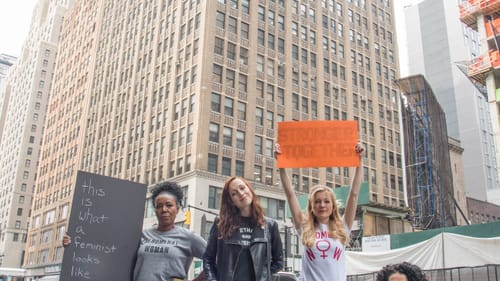Stay in the Loop
BSR publishes on a weekly schedule, with an email newsletter every Wednesday and Thursday morning. There’s no paywall, and subscribing is always free.
F stands for feminism and fun
Philly Fringe 2018: Radiant Bloom Productions presents Irene Molloy's 'The F Word' (second review)

Irene Molloy’s The F Word, Radiant Bloom Productions’ Fringe entry, offers an informative and inspiring revue of U.S. feminism’s greatest hits. Too few know how feminist activism has shaped our country and culture, which means this show is not just for women.
In the wake of #MeToo, our country needs women’s stories in entertainment more than ever.
The F Word illustrates how much fun those stories can be, and the cast’s stellar renditions of popular music will make you dance in your seat.
Suffragist city
The show began with a mock Q&A during which cast members responded to Demetria Joyce Bailey’s question, “What is feminism?” Responses ranged from common stereotypes to widely accepted ideas about equality.
Meredith Beck, Erica Cochran, Heeya Kim, and Kalyn West danced onto the stage to join Bailey in a rendition of “Sisters Are Doin’ It for Themselves.” This set the tone for The F Word’s inspiring message delivered by a diverse cast with great voices.
The F Word conveyed that gender equality and female independence are relatively new ideas. Its five performers sang songs tracing the waves of American feminism from the mid-1800s to the present, accompanied by music director Miche Braden on keyboard, Jacob Shipley on guitar, and Ryan McCurdy on percussion.
The cast brought enthusiasm and emotion to dialogue and vignettes between musical numbers. Shipley and McCurdy donned multiple personas to demonstrate the many ways in which feminism impacts both men and women.
For instance, a suffrage anthem sung by Beck was followed by Bailey’s performance of Sojourner Truth’s famous “Ain’t I a Woman?” speech. After that, McCurdy sang “Since My Margaret Became a Suffragette,” a tune about a feminist who “wears the pants to kill romance.”
West shone in the role of pants-wearing Margaret, who danced an impressive tango first around, and then with, McCurdy. Her expressive face communicated conflicting emotions: did she desire her singing lover, or did he annoy her?

Fighting for our rights
But the fight for equality continued after the 19th Amendment. Women made important contributions during World War II, which The F Word captured in an appealing Andrews Sisters-style number about Rosie the Riveter. But when the boys came home, professional opportunities and freedom in gender expression were replaced with the restrictive roles of the 1950s.
Feminists fought back, as the women of the cast demonstrated with “You Don’t Own Me,” featuring terrific vocal harmony. By the end, the women’s aprons were ripped off, crumpled, and thrown to the floor.
The show’s second act covered the latter half of the 20th century, with songs including “I Am Woman” and “Respect,” an ensemble number which also featured fun Temptations-style synchronized dance steps.
Dar Williams’s “When I Was A Boy,” sung by Kim, explored replacing binary gender construction. Throughout the song, the cast members became children at play free to experience their bodies and emotions in ways adults typically can’t: a boy picks flowers, a girl rides a bike shirtless in summer.
The F Word also addressed sexual assault and violence against women, which remain shockingly common. Molloy used sobering statistics bolstered by Cochran’s haunting version of “Me and a Gun,” the song Tori Amos wrote about her own rape.
Perhaps the fourth wave of feminism -- which the show characterized as more diverse, intersectional, and inclusive than the feminisms of our country’s past -- can dismantle rape culture and welcome the voices of transwomen, gender non-conforming people, women of color, disabled women, and others.
Early on, Bailey recited a quote from Maya Angelou: “We are braver and wiser because they existed, those strong women and strong men. We are who we are because they were who they were. It’s wise to know where you come from, who called your name.”
The F Word is a powerful reminder to audiences that we are who we are because U.S. feminists were who they were. I challenge viewers to leave the theater unmoved.
To read Mark Cofta's review, click here.
What, When, Where
The F Word. By Irene Molloy, Lauren Widner directed. Radiant Bloom Productions. Through September 19, 2018, at the Asian Arts Initiative, 1219 Vine Street, Philadelphia. (215) 413-1318 or fringearts.com.
Sign up for our newsletter
All of the week's new articles, all in one place. Sign up for the free weekly BSR newsletters, and don't miss a conversation.

 Melissa Strong
Melissa Strong